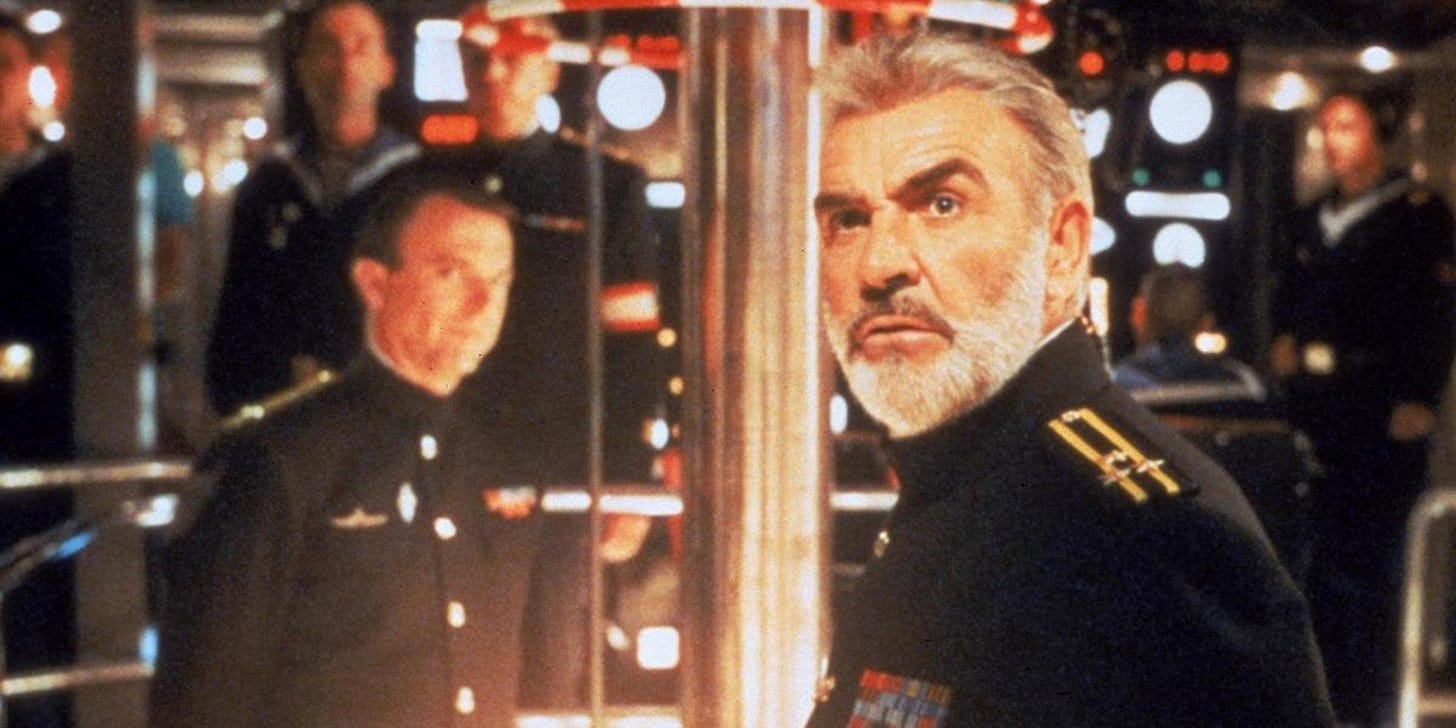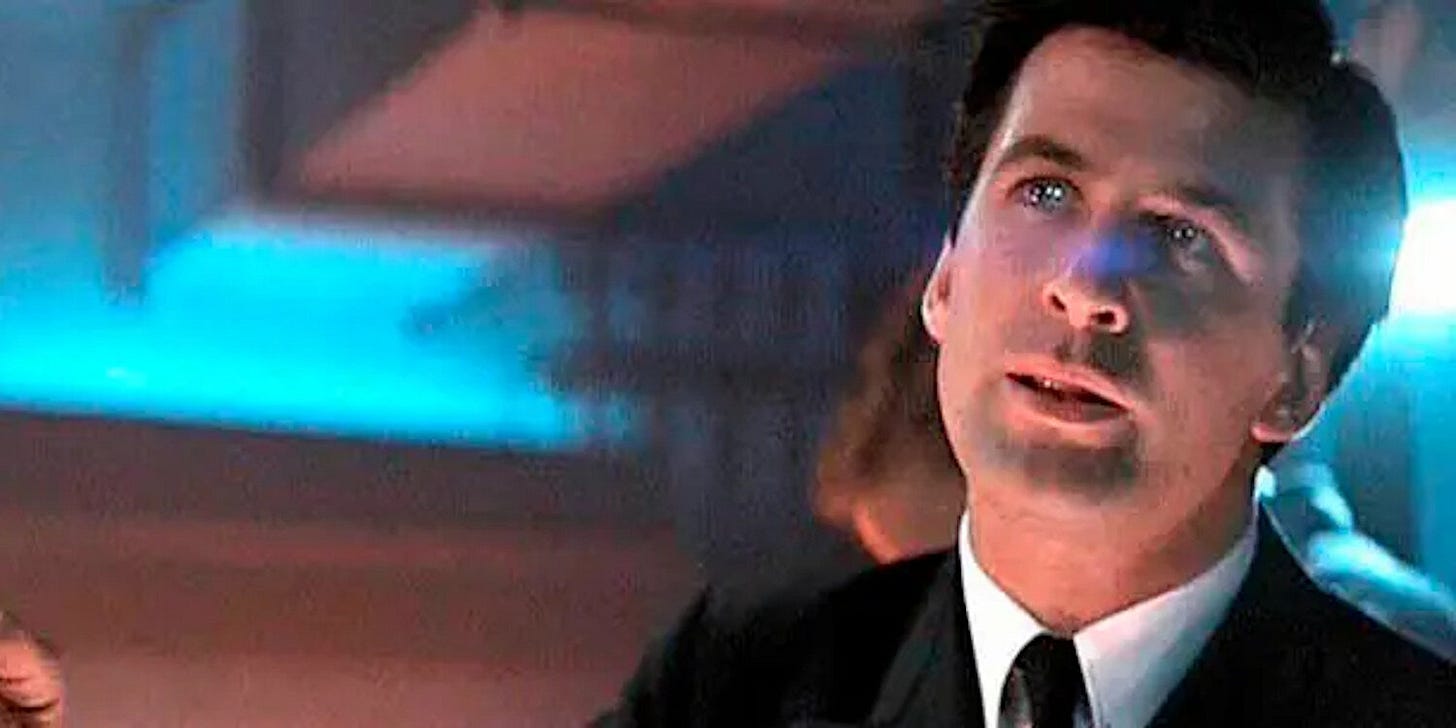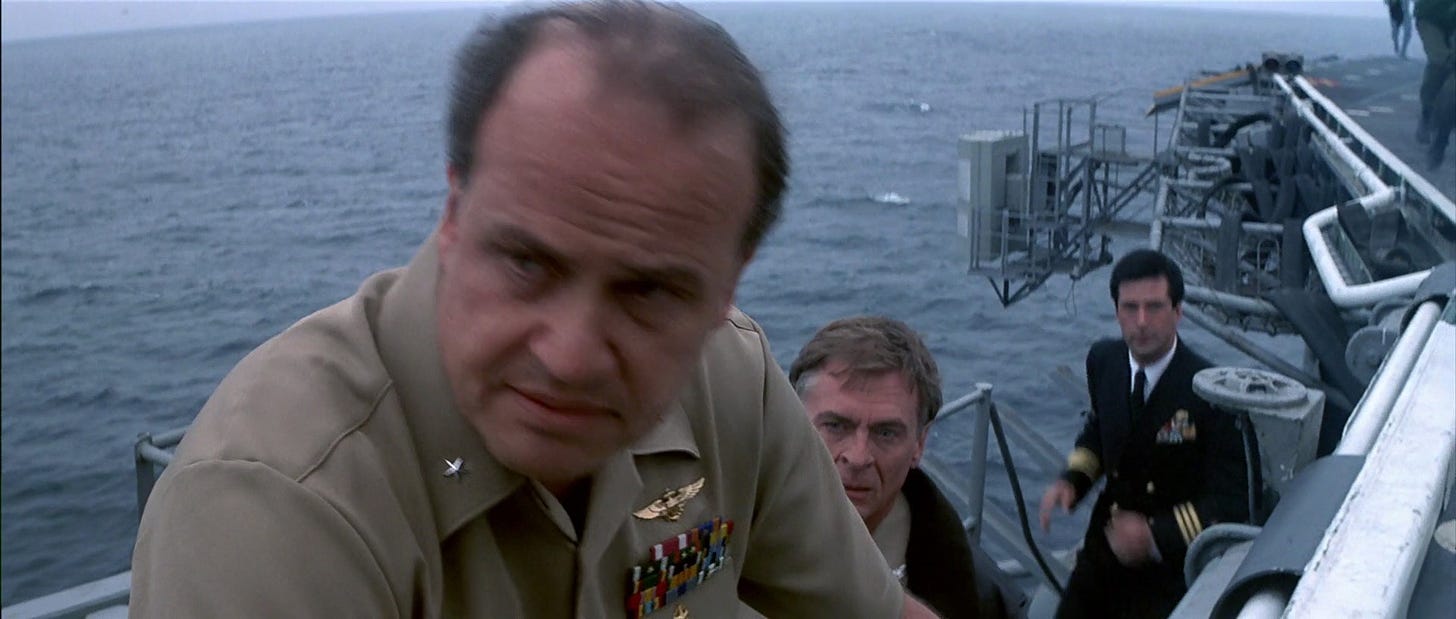The Hunt for Red October: Crazy Ryan
"This business will get out of control. It will get out of control, and we'll be lucky to live through it."
There is a certain kind of middle-aged man whose heart leaps at the words “caterpillar drive,” “Crazy Ivan” or “one ping only.” Or for that matter, hearing a Russian sub commander speak with a Scottish accent.
That man is me. Everyone has their film that they love disproportionately without regard to its quality. I have a list, and The Hunt for Red October may sit atop it. It’s my kind of comfort film. A Notting Hill for my set. Not to say it’s a bad movie. Far from it. But it’s not a great movie. No one will put it in a book about 1,000 films you have to see before you die.
And yet. It touches all the bases. From the cast, to the plot, to the action, to the dialogue, which is eminently quotable. This is what critics used to refer to as studio craftsmanship, when everyone connected to the production does their job well. Which is fitting, because it’s a movie about people who do their job well. I think that’s why I adore it. It was directed by John McTiernan, who knew a little bit about making smart thrillers as he also helmed Die Hard.
I’m an easy mark for films about professionals under fire keeping cool and going about their business while solving problems.1 Red October is laden with such moments. The world tilts on the edge of nuclear armageddon and only our hero, Jack Ryan (Alec Baldwin), seems particularly rattled by the idea. The two submarine commanders in the film, played by Sean Connery and Scott Glenn, are, as Glenn’s character would say, “cool customers.” In that regard, the film is a throwback to 50s sub thrillers such as The Enemy Below and Run Silent, Run Deep.
Red October was already so out of date at the time of its release in 1990 that its makers had to set the action six years earlier. The world had changed that much. The Wall had fallen. The Soviet Union had collapsed. The movie was an adaptation, of course, of the book by Tom Clancy, who made his fortune writing about Reagan-era Cold War conflict. The book had been released at the height of renewed U.S.-Soviet tensions – and I doubt Clancy could have foreseen the fictional world he created all becoming moot so rapidly.
I was never a fan of Clancy’s work, but it seems to me that the Jack Ryan portrayed in Red October was the closest to the character as he first wrote it, an analyst who writes reports and is not a natural man of action. A thinker with less than perfect abs. Later iterations, in film with Harrison Ford and on TV with John Krasinski, turned Ryan into a more generic kind of hero. Baldwin is good in the role because he seems out of his league from the start; he’s our everyman entrypoint for this global-level conflict. It’s one reason why all the exposition about silent drives and submarine tactics never seems forced. Ryan is learning as he goes. Because he has no lived-in experience, he needs to convince people he’s right. And those moments are the movie’s most effective ones.
Baldwin was still ascendent as a Hollywood leading man at this point, and Red October marked an opportunity to place him in a blockbuster franchise to see if he could be bankable. Why he never became a huge movie star is one of the bigger mysteries of the day. Certainly, his choice of material was not exceptional. After this film came a string of mediocrity (hide your eyes if you must): The Marrying Man, Prelude to a Kiss, a remake of The Getaway (ugh, why??), The Shadow, The Edge, Ghosts of Mississippi. . .
For whatever reason, Baldwin never took off. Was it him? He was undeniably talented and has proved his versatility as a supporting actor over the last 25 years. He may have been incapable of playing things straight in the manner a leading role sometimes demands. He was too much the Long Island wiseass. And maybe he was too shifty and untrustworthy, as evidenced by his iconic cameo in Glengarry Glen Ross. Later, he put on weight, left the leading-man game, and found himself, particularly on “30 Rock,” where he proved he was a master of the rapid-fire, screwball dialogue favored by Tina Fey and the show’s writers.
But he’s quite good in Red October largely because he doesn’t have to do the heavy lifting. That’s left to Connery, who is so relaxed, steely and self-assured in his role that he makes the whole movie work – thanks in a large part to the wise choice to allow him to use a natural accent and not force a Russian one on him. (The Australian actor Sam Neill doesn’t get off as easily.) The trick of the movie is to make both Connery and the Americans chasing him sympathetic characters, and that happens because everyone involved has a task to do. (Another good example is The Fugitive.) From Connery’s Captain Ramius to Baldwin’s CIA operative Ryan to Glenn’s Commander Mancuso and his loyal crew of the USS Dallas, including the perceptive sonar operator Jonesy. All of them are committed to excellence. Conflict, when it arises, comes as a result of each person’s view of their own duty.
The plot? You want the plot? Ok. Connery’s Marko Ramius skippers a top-secret Russian nuclear submarine with an experimental silent drive. It’s a possible “first strike” weapon because it could conceivably approach the American coast undetected. Ramius doesn’t believe such a device should exist and so covertly plans to defect and turn it over. But U.S. authorities have no way of knowing that and so view the approaching Red October as a potential threat that must be eliminated.
The situation makes for a lot of tense conversations and sardonic observations, delivered mostly by an all-star squad of character actors including Hall of Famer Fred Dalton Thompson as a Navy admiral. This movie gets four stars in my book just for having Thompson say “hubbub.” 2My favorite though is Richard Jordan as Jeffrey Pelt, the White House National Security Adviser who gets all the best lines: “I’m a politician,” he tells Ryan. “That means when I’m not kissing babies, I’m stealin’ their lollipops. But it’s also taught me to keep my options open.” Then, of course, you have Neill’s tragic arc. Someone has to pay the price for Ramius’ impetuousness: ”I would like. . . to have seen. . . Montana.”
The movie is also legitimately thrilling, with the cat-and-mouse games played by the submarines done with particular effectiveness for 1990. Today, these sequences would undoubtedly look more cartoonish because of the reliance on computer graphics. And the sequence where Baldwin is lowered onto a submarine during a North Atlantic storm never disappoints for its realism.
I am, in fact writing this from Scotland, which divides that stormy North Atlantic from the North Sea. The sky here is filled with those low, gray clouds that hang above Ramius in the early moments of the film before his boat submerges. Few films have portrayed the ocean as so foreboding, even low-hanging fruit such as Titanic and The Perfect Storm. At one point, Ryan is told if he falls into the water, he has four minutes to survive.
Scotland, given its location (not far from Polyarny, the prime Soviet submarine base in northern Russia), played a key role in the Cold War. You can read more here.
One of the more interesting aspects of this project is discovering how the early 1980s connect to the early 60s thematically. They are the two periods in film where fear of an all-out nuclear conflict took hold. In contrast, America in the late 60s and for most of the 70s was concerned with other things: Vietnam, Watergate, inflation, the sexual revolution and new cultural freedoms. Some of that was made possible by the state of detente that existed between the U.S. and U.S.S.R. That ended with Reagan’s rise to power in 1980.
Red October lies outside that paradigm as it came out after the end of the Soviet Union. It is, on its own way, a strangely nostalgic piece for a time when the two superpowers were on the brink of destroying each other. But that doesn’t make me love it any less. One ping only, Vasily.
WHERE CAN I WATCH IT: Anywhere, probably. You can come over to my place and I’ll do an entire reenactment for, I don’t know, $50. Nuclear Theater could use some new revenue streams.
ARMAGEDDON INDEX: 6/10: If another Soviet commander had gotten his hands on the Red October, there could have been real trouble.
DUST CLOUDS: The movie is set at a time when Soviets feared they were losing the arms race after Reagan pumped up U.S. defense spending. Connery’s Ramius makes reference to the halcyon days of Sputnik when “the world trembled” at Soviet power. In reality, the Soviets were rattled then by the potential development of Reagan’s Strategic Defense Initiative (better known as “Star Wars”), which they feared could upset the balance of power. (Even though the technology involved didn’t exist and still doesn’t.) At that point, the Soviets were not technologically superior to the United States in any way, but that didn’t keep Reagan from claiming as such during his 1980 presidential campaign, much as John F. Kennedy did 20 years earlier.
WHAT ELSE AM I WATCHING: TV: Shogun (S1, Hulu), Curb Your Enthusiasm (S12, HBO), Resident Alien (S2, Netflix). Movies: Violence (Bernhard, 1947), The Outlaw King (McKenzie, 2018).
COMMENTS or SUGGESTIONS: nucleartheater@gmail.com.
LAST ENTRY: Testament (1983).
NEXT ENTRY: Kiss Me Deadly (1957).
Apollo 13 also comes to mind. I’m sure you have your own favorites.
I had the privilege as a reporter for the Chicago Tribune of covering one of Thompson’s 2008 presidential campaign events in Iowa, which was notable for both its brevity and Thompson’s complete disinterest in doing anything a presidential candidate needs to do to win over voters.







Outstanding. Thanks for calling out Richard Jordan and that great line. He steals every scene he's in. And let's not forget about the sweaty perfection of Skarsgard in pursuit. My son refers to movies like this as "smart men in small rooms talking." I'd put Moneyball and The Big Short in that category. Like October and Apollo 13, just endlessly watchable.
The book was published by the US Naval Institute Press. I don't know if it was passed up by major publishers. I think it was the only bestseller they ever published